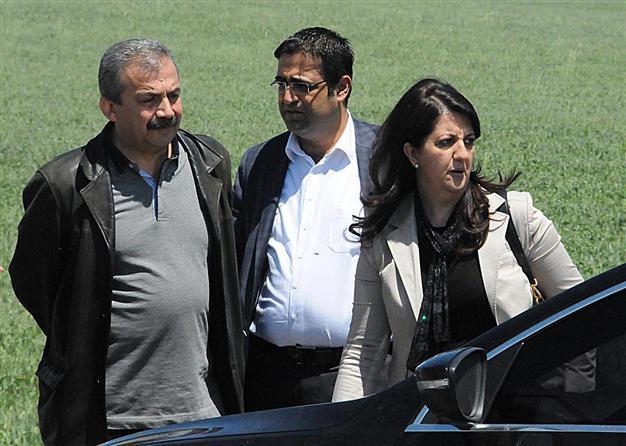Gov’t and jailed PKK leader signal results in peace process
ISTANBUL

The HDP's Önder (L), Baluken (C) and Buldan (R) visited outlawed PKK leader Öcalan. (DHA photo)
The Turkish government and the leader of the outlawed Kurdistan Workers’ Party (PKK), Abdullah Öcalan, have both separately said the 30-year-old conflict in Turkey’s southeast is about to come to an end with recent peace talks.Deputy Prime Minister Beşir Atalay said the peace process was going ahead “at full speed,” adding that they expect to complete the “toughest phase” of the peace process by the end of the month.
“The peace process is continuing at full speed. We are working non-stop on maturing the road map. On the other hand, our friends are meeting with İmralı,” Atalay told reporters on Aug. 15, referring to the island prison where Öcalan is currently serving a life sentence.
“After the road map has taken its final shape, we will shape it with state institutions. These will then be shared with the other side [the PKK] in a proper way. This phase is a difficult one, but I believe we will complete it before September,” he added.
Atalay’s remarks came a day after he met with lawmakers from the Peoples’ Democratic Party (HDP).
Three deputies from the HDP, Pervin Buldan, İdris Baluken and Sırrı Süreyya Önder, visited Öcalan on İmralı Island on Aug. 15. They conveyed a written statement from Öcalan in which he stated that “the 30-year war is at its ending phase via democratic talks.”
“We are experiencing a phase with large effects and results. This period offers historic opportunities based on peace and freedoms, which could create a model for solving weighty problems not only in Turkey but also across the region,” Öcalan said, adding that the nearly 10 percent of votes netted by the HDP in the Aug. 10 presidential election was an “approval for peace and brotherhood.”
“With these results, the HDP, with its broadest base, will be today’s democratic opposition and the future’s democratic ruling party,” he said.
Up to now, the infamous 10 percent election threshold for a party to be represented at Parliament has prompted minor pro-Kurdish parties to resort to a variety of different formulas to secure representation in the national assembly. Therefore, the 9.76 percent vote received by the HDP’s Selahattin Demirtaş in the first-ever direct presidential election on Aug. 10 has been interpreted as pushing the “psychological threshold” of 10 percent.
In his statement, Öcalan added that the new period of transition was about “moving the idea of a democratic Turkey from a utopia to a reality.”
Last month, Parliament adopted a new reform bill aimed at giving the talks fresh momentum, which was hailed by Öcalan.
Atalay recently said efforts to find a peaceful resolution of the Kurdish issue had entered a new phase and the government was working on a road map. The cease-fire between Turkey and the PKK has been continuing since March last year, after which many militants left the country.
















